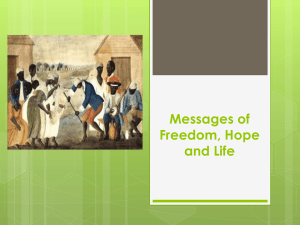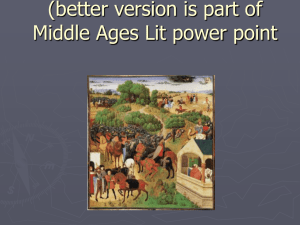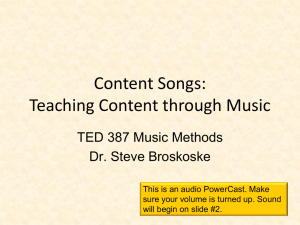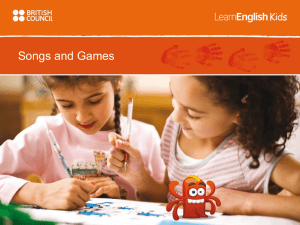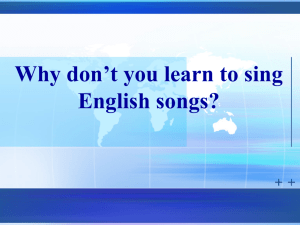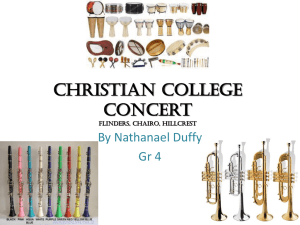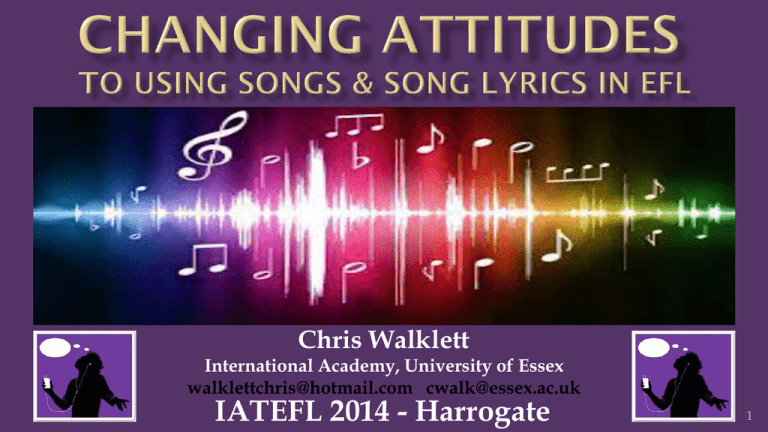
Chris Walklett
International Academy, University of Essex
walklettchris@hotmail.com cwalk@essex.ac.uk
IATEFL 2014 - Harrogate
1
Tim Murphey (1992) “predated and possibly evolved into speech”
Dwayne Engh (2013) “sub-vocal involuntary mental rehearsal”
Karen Ludke (2009) “ there is evidence from a variety of sources to suggest
that using songs as pedagogical material can be very effective”
S. L. Medina (2008) “the integration of music in the second language
classroom can enhance overall language acquisition”
Dwayne Engh (2013) “a gap in teacher pedagogical research supporting the
use of music in language learning since the 1990s “
Freda Mishan (2005) “reinforcing the meanings of the words with actions,
sounds and cognitive engagement”
2
The general wisdom
- songs and song lyrics are authentic & motivational ways to learn
My sneaking suspicion
- songs and song lyrics are disappearing from EFL course books (& perhaps
from the classroom too)
Why this study is an important one?
- it appears that there has been no previous research into the
diminishing use of this resource and hence no previous research into
whether attitudes to the use of songs and song
lyrics in EFL are changing and why?
...This then is to investigate...
3
Songs and song lyrics are one of the natural
ingredients of the Communicative Approach
*
The 70s were a heyday for using songs/song lyrics in EFL
*
Instances of use in the 80s; Headway & Matters
*
In the 90s, Inside Out & English File, amongst others, joined the fray
*
Songs have long since formed a staple part of the EFL teacher’s diet
4
All evidence seems to suggest use of this resource is on the wane
but how to test this hypothesis?
Have attitudes to and use of songs and song lyrics changed in recent years?
3 pronged attack
1) Interviews with those in the field...foot soldiers - teachers I know
2) Contact with textbook/course book writers - players in the field
3) Analysis of course books/textbooks - then and now
5
For real, qualitative data I interviewed three ‘long- standing’ tutors to get an ‘insiders’ view;
Interviewee X (male, 38)
Interviewee Y (male, 62)
Interviewee Z (male, 58)
6
I was persistent & lucky...
David Hill - Traditional Folk Songs etc.
Lindsay Clandfield - Global
Vaughan Rees – Inside Out
+ Others included Gilly Cuningham (Face2Face),
Simon Andrewes and a Managing Editor from English File
7
The changing interests and appetite of teachers, or students, or both?
An actual change in the needs of the students, or just a perceived change?
Cultural sensitivities, and an increase in the awareness of these issues?
Practical concerns, such as, in our increasingly digital age, copyright issues?
Some other, as yet unconsidered, factor/factors?
8
English File
Inside Out
(New) Headway Landmark
Reward
Cutting Edge
Panorama
Matters
Clockwise
Natural English Wavelength Handshake
Observations
English I.D.
Total English
Objective
Global
Language in Use
Straight Forward
Language Leader
New Framework
Interchange
Life
Face2Face
Essential English
Touchstone
9
English File
Inside Out
Cutting Edge
(New) Headway
Matters
Natural English
Panorama
Clockwise
Reward
Wavelength
Landmark
Handshake
Observations
Objective
Language in Use
Face 2 Face
English I.D
Global
Life
Straight Forward
Total English
Language Leader
Essential English
New Framework
Interchange
Touchstone
1983-2002 2003-2010
2011 on
YES
YES
YES
YES
YES
YES
YES
NO
NO
NO
NO
NO
NO
NO
NO
N/A
N/A
N/A
N/A
N/A
N/A
N/A
N/A
N/A
N/A
N/A
YES
YES ?
*
*
N/A
N/A
N/A
N/A
N/A
N/A
N/A
N/A
N/A
N/A
N/A
*
NO X
NO
NO
NO
NO
NO
NO
NO
NO
NO
YES
YES
YES
YES
N/A
N/A
N/A
N/A
N/A
N/A
N/A
N/A
N/A
N/A
N/A
YES
NO X
NO
NO
NO
NO
NO
NO
NO
NO
NO
10
...my 3 pronged attack...
...seemed in turn to yield 3 main reasons for these changes
1) Changing Attitudes
2) Cultural Reasons
3) Copyright Issues
11
“The environment we work in has
become more bureaucratic across the
board” (IX)
“The students still get the same pleasure in
songs. but we as teachers are more nervous
about using them” (IY)
“In the 1970’s, 80’s and 90’s teachers felt “appetite has decreased...more and more
freer in general about experimenting with students are driven by specific goals, you
anything and everything” (DH)
can see how the publishing world has
responded to that” (IZ)
“It amazes me how (music) still
resonates with...overseas people” (IX)
“Songs can be relevant...and should be...but
“I’ve been in the classroom 30 years and maybe students don’t think they are” (IZ)
students have always responded
“the Communicative Approach and its
enthusiastically to language activities
inherent teaching methodologies are no
based on songs” (VR)
12
longer held in such reverence” (CW)
The way it was
The Way it is
“Cultural awareness didn’t
really raise its head” (IX)
“songs are the first thing to go, it’s political correctness”
“maybe it’s slightly embarrassing sitting in class and
“I think teachers felt much
listening to a song and thinking, is everybody comfortable
freer in general to do what
with this?” (both IY)
they liked” (IZ)
“songs carry a lot of culture
with them” (IZ)
“There can be little doubt that care needs to be taken with
such potentially ‘culturally loaded’ items” (CW)
“songs will always be a way “I don’t expect to see them (songs) in books in the
in (to British culture) (IX) future...but do we expect to see books in the future?” (IX)
13
…
“The choice of songs was hugely restricted culturally...but had great
resonance with that culturally limited audience...”
…
“Songs were tremendously motivational as long as young and not so
young...learners were familiar with and admired a particular popular
culture”
…
“The importance of this particular aspect falls away the more English
becomes global. The singers and songs and their contexts become less
and less compelling the more remote we are from that once bonding and
inspirational cultural set up”
14
“ a nightmare and very costly” (DH)
“Copyright complications, ease of access to song lyrics via the net and difficulty in
finding appropriate songs for classroom use” (English File Managing Editor)
“Not worth the grief of searching to find one (a song) that fits the theme...only to find
out that you can’t have it or it’s too expensive” (GC)
“Less freedom to manipulate the lyrics, leading to songs becoming much less
prevalent“(VR)
“Permission to re-use songs is expensive, clearing rights is time consuming and this
has become more difficult with the demand for course material to be delivered on
different media” (English File Managing Editor)
“English File…went to some lengths to get round the copyright laws...because they
(the songs) were considered quite central to their methodology…“ (SA) 15
...very much 2 sides to the story...
The writing is on the wall for those who can bear to look...
But teacher’s, writers and EFL professionals hold strong views on this issue...
“music is universal, people have loved it throughout history...I don’t think
that’s ever going to change...if EFL materials don’t reflect this then that’s a
very sad state of affairs to be in” (IY)
“we are losing a lot...it’s throwing the baby out with the bathwater” (IZ)
16
Engh. D.(2013) Why Use Music In English Language Learning. A Survey of the Literature. Found at;
http://ccsenet.org.journal/index.php/elt/article/view/
Konopczynski, G. (1998) Language Development. Typical & Atypical.
Found at; http://65.54.113.26/Author/1383946/gabrielle-konopczynski
Ludke, K. (2010) Songs to Support foreign language education. Unpublished PHD thesis. Found at;
https://www.era.lib.ed.ac.uk/handle/1842/5500.
Medina, S. L. (1990) The Effect of Music on Second Language Vocabulary Acquisition. Found at
http://eric.ed.gov/?id=ED352834.
Mishan, F. (2005) Designing Authenticity into Language Learning Materials. Bristol. Intellect.
Murphy, T. (1992) ‘The discourse on pop songs’. TESOL Quarterly
Sposet, B (2008) The Role of Music in Second Language Acquisition: A Bibliographical Review of 70
Years of Research. Edward Mellen Press
http://emportfolio.eu/emp/images/stories/materials/EMP_Teachers_Handbook_Final_2012.pdf/
17
Please get in touch -walklettchris@hotmail.com or cwalk@essex.ac.uk
T “Ah yes – they don’t write lyrics like that any more...”
N.B. Source of cartoon unknown but lyrics are, of course from The Sex Pistols – Anarchy in the UK.
18
1) Some Might Say – Oasis
2) Suspicious Minds – Elvis Presley
3) Nothing Lasts Forever – Echo & the Bunnymen, Maroon 5 etc.
4) Who Are You? – The Who
5) Changes – David Bowie
6) Read it in Books – Teardrop Explodes / Echo & Bunnymen
7) 1, 2, 3 – Len Barry
8) The Way it is – Huey Lewis & The News
9) When the Music’s Over – The Doors
10) Thank You – Jamelia / Alanis Morisette etc.
19

